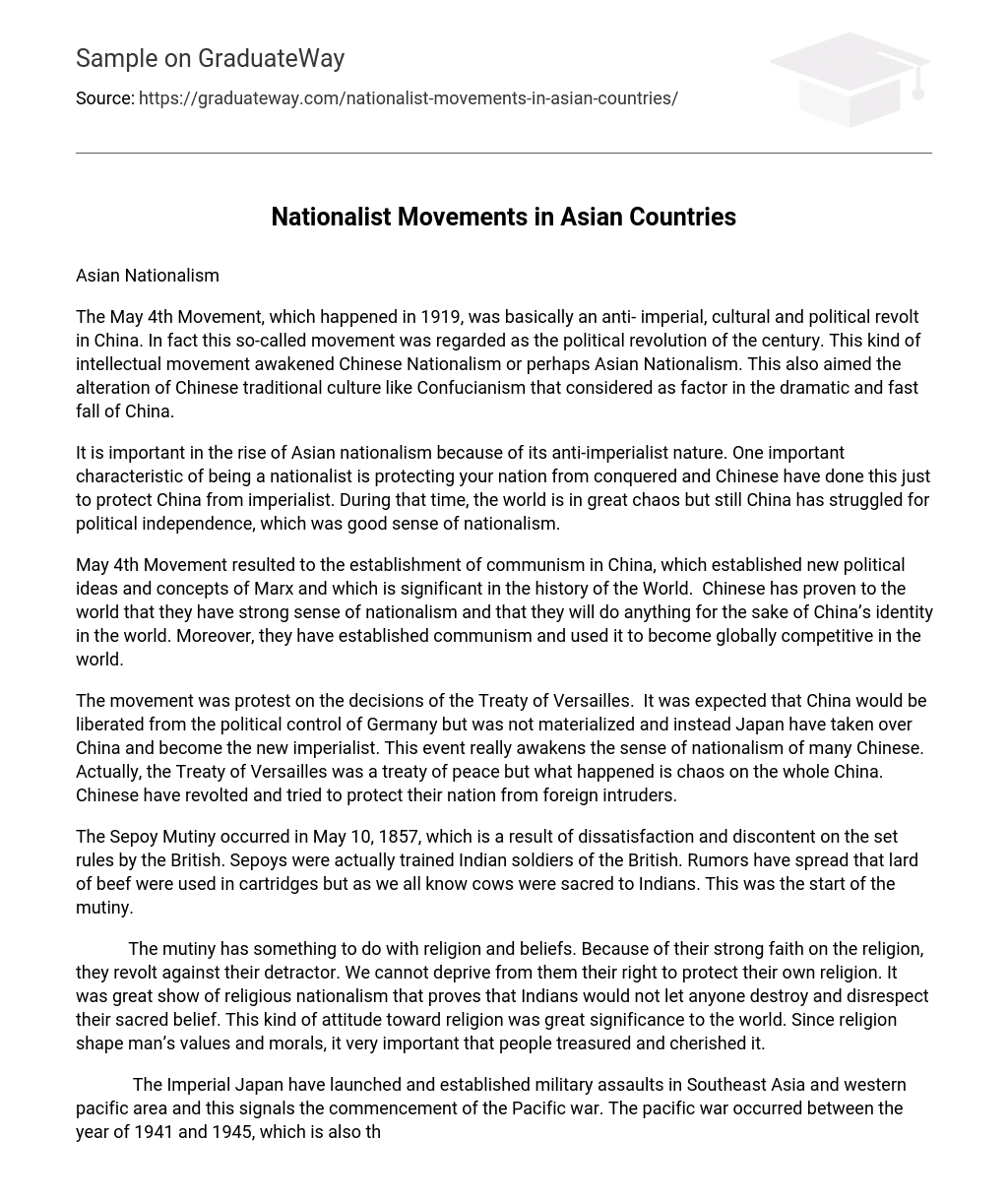Asian Nationalism
The May 4th Movement, which happened in 1919, was basically an anti- imperial, cultural and political revolt in China. In fact this so-called movement was regarded as the political revolution of the century. This kind of intellectual movement awakened Chinese Nationalism or perhaps Asian Nationalism. This also aimed the alteration of Chinese traditional culture like Confucianism that considered as factor in the dramatic and fast fall of China.
It is important in the rise of Asian nationalism because of its anti-imperialist nature. One important characteristic of being a nationalist is protecting your nation from conquered and Chinese have done this just to protect China from imperialist. During that time, the world is in great chaos but still China has struggled for political independence, which was good sense of nationalism.
May 4th Movement resulted to the establishment of communism in China, which established new political ideas and concepts of Marx and which is significant in the history of the World. Chinese has proven to the world that they have strong sense of nationalism and that they will do anything for the sake of China’s identity in the world. Moreover, they have established communism and used it to become globally competitive in the world.
The movement was protest on the decisions of the Treaty of Versailles. It was expected that China would be liberated from the political control of Germany but was not materialized and instead Japan have taken over China and become the new imperialist. This event really awakens the sense of nationalism of many Chinese. Actually, the Treaty of Versailles was a treaty of peace but what happened is chaos on the whole China. Chinese have revolted and tried to protect their nation from foreign intruders.
The Sepoy Mutiny occurred in May 10, 1857, which is a result of dissatisfaction and discontent on the set rules by the British. Sepoys were actually trained Indian soldiers of the British. Rumors have spread that lard of beef were used in cartridges but as we all know cows were sacred to Indians. This was the start of the mutiny.
The mutiny has something to do with religion and beliefs. Because of their strong faith on the religion, they revolt against their detractor. We cannot deprive from them their right to protect their own religion. It was great show of religious nationalism that proves that Indians would not let anyone destroy and disrespect their sacred belief. This kind of attitude toward religion was great significance to the world. Since religion shape man’s values and morals, it very important that people treasured and cherished it.
The Imperial Japan have launched and established military assaults in Southeast Asia and western pacific area and this signals the commencement of the Pacific war. The pacific war occurred between the year of 1941 and 1945, which is also the time when the World War II has flourished. In this war the first major naval battles, first suicide attacks and first nuclear assaults have all happened.
The war has brought a great tragedy to Southeast Asian nations particularly Philippines. The Philippines have suffered lot of pains from the imperialist. In fact, many lives have been sacrificed. Japanese have tortured Filipinos including women, old man and even very young children
This situation has raised the sense of Nationalism of many Filipinos. Revolts were everywhere and even they did not have sophisticated weapons, they continued to pursue their goal—to obtained freedom from imperialism. Many die but nationalism did not perished from them. This strong feeling of nationalism has a great value on them. It gave hope to Filipinos.
The May 4th Movement, World War I and Treaty of Versailles, Sepoy Mutiny and Pacific War have played very important roles in building the strong sense of nationalism of many Asian nations. These entire events have a great impact in the world that would be a mark that would always made us remember that Asian nationalism prospered in many countries in Asia.
Work Cited
History of India: First Indian War of Independence. 13 December 2007. 13 December 2007
< http://www.kamat.com/kalranga/itihas/1857.htm>.
In World War I. 13 December 2007 < http://www.infoplease.com/ ce6/history/A0861782.html>.
The May Fourth Movement.13December 2007<http://afe.easia.columbia. edu/china/modern/read2.htm>.
The Pacific War: A World War II Special Feature. 2003. 13 December 2007 < http://www.wtj.com/articles/pacific_war/>





